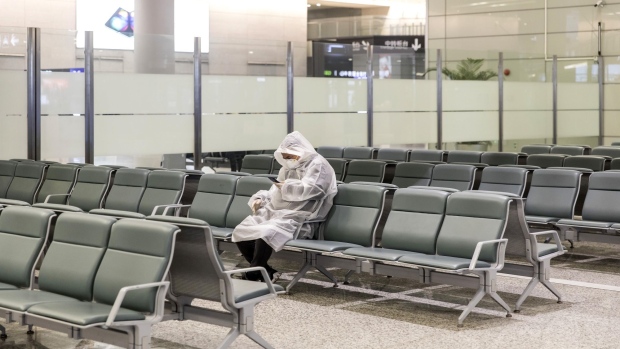Mar 2, 2020
Six Trade Remedies to Help the World Economy Minimize the Virus Fallout
, Bloomberg News

(Bloomberg) --
Markets have so far focused on what action central banks like the Federal Reserve, the Bank of England and the Bank of Japan might take to soothe fears about the spreading of the coronavirus and its impact on the global economy. But central banks don’t make vaccinations, of course. They also don’t unclog supply chains.
So, leaving aside the search for an epidemiological cure, what might a trade one look like? Here’s some back-of-the-envelope ideas:
- Coordinated action. G-20 finance ministers missed the opportunity when they met in Saudi Arabia last month. But they’ll come under more pressure to offer a unified front. France’s Finance Minister Bruno Le Maire said Monday that G-7 finance chiefs will hold a teleconference this week to ensure responses are “as coordinated as possible.” That might help. But a joint statement from the leaders of the G-20 renouncing protectionism as they did at the time of the global financial crisis more than a decade ago would carry an even bigger punch.
- A U.S. rollback of China tariffs. President Donald Trump famously has called himself “Tariff Man” but even a small symbolic and temporary decrease in the tariffs that remain in place on $360 billion in goods from China would help get the Chinese economy back to work and reduce the cost being borne by U.S. importers. It also would reaffirm the case for diminished trade tensions that markets seized on coming into 2020.
- Chinese purchases. Skepticism remains the rule on the promise of a $200 billion buying spree that Trump extracted from Xi Jinping as part of their “phase one” deal signed in January. Xi has other things on his mind. Some big orders for passenger jets, soybeans and even some American steel would show intent — and placate some market fears that the deal could fall apart.
- A moratorium on other tariffs. The virus has now spread to at least 60 countries. It is no longer a Chinese phenomenon. And neither is the economic effect. Imagine if the trade ministers of major market economies like the U.S., European Union and Japan took the opportunity G-20 finance ministers didn’t and signed up to a moratorium on any new tariffs as long as the World Health Organization was flashing pandemic warning signs.
- Help for affected companies. Economic crises are almost always about secondary effects. The fear emerging now is that companies forced to shut down even temporarily could eventually end up having trouble servicing debt, or worse, face bankruptcy. Some governments have already promised fiscal help. But how about a G-20 pledge to have a tax holiday for affected companies? Or at least a move to make any mitigation costs tax deductible?
- Help services providers. Trade isn’t just about goods, of course. And services companies from airlines to hotels and restaurants are already taking a hit from cancelled flights and conferences, travel restrictions and the uncertainty about what lays ahead. Don’t forget about the universities and schools being affected, the architects with stalled projects, and all the transportation workers left idle.
All of that seems far-fetched, of course. We are not living in a world of cohesive policy recipes. But with central banks confronting limited ammunition and a crisis where their intervention may only go so far, let’s hope someone is thinking beyond cutting interest rates.
Charting the Trade War
The U.S. merchandise-trade deficit narrowed in January for the fourth time in five months ahead of disruptions that emerged following the outbreak of the coronavirus.
Today’s Must Reads
- At loggerheads | British and EU officials will start hashing out a trade deal this week. The U.K., meanwhile, released negotiation objectives for separate talks with the U.S.
- Self-reliance | Huawei, the Chinese technology giant barred from doing business with U.S. suppliers, is finding a way around the strict limits imposed by the Trump administration.
- Downgrades galore | Global economic growth will sink to levels not seen in over a decade as the virus outbreak hammers demand and supply, challenging policy makers to respond to a fast-changing situation, according to the OECD.
- Vital minerals | In a high-tech twist on hammering pickets into the ground, the U.S. State Department has helped launch an online tool aimed at staking America’s claim to many of the world’s rare-earth minerals.
- Noisy numbers | South Korea’s exports rose for the first time in more than a year on semiconductor sales, an increase that may be short-lived because of the virus. Separately, Vietnam’s exports jumped as Samsung increased shipments of phones.
Economic Analysis
- China insight | The virus threatens to plunge China’s economy into contraction, sending shock waves around the world.
- Export bellwether | A rebound in South Korea’s trade figures may give way to further declines in coming months.
Coming Up
- March 6: U.S. trade balance, Canadian merchandise trade
- March 7: China trade balance
To contact the author of this story: Shawn Donnan in Washington at sdonnan@bloomberg.net
To contact the editor responsible for this story: Brendan Murray at brmurray@bloomberg.net, Zoe Schneeweiss
©2020 Bloomberg L.P.